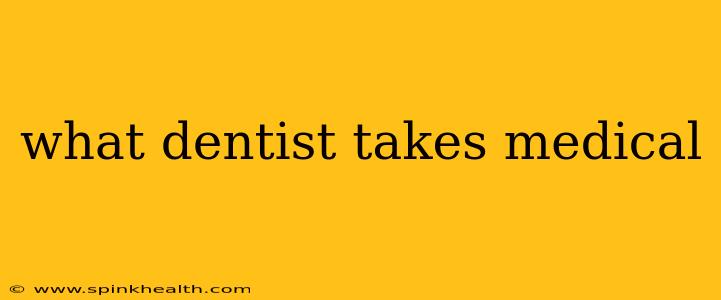What Dentist Takes Medical? Navigating Dental Insurance and Payment Options
Let's be honest, nobody enjoys unexpected dental bills. The question "What dentist takes medical?" often stems from a desire to utilize health insurance to cover dental procedures, a scenario that's not always straightforward. This isn't a simple yes or no answer; it depends on several interconnected factors. Let's unravel this complex issue, addressing common questions and concerns along the way.
What types of dental insurance are there?
Dental insurance, unlike medical insurance, often works differently. Most plans are designed specifically for dental care and don't typically integrate with broader medical insurance policies. Think of them as separate entities. You'll typically find:
- Traditional Dental Insurance: This is the most common type. It involves a monthly premium, annual maximum coverage, and deductibles, similar to medical insurance but focused solely on dental services. Coverage varies widely depending on the plan.
- Dental HMOs (Health Maintenance Organizations): These plans usually require you to choose a dentist from their network. They often have lower premiums but may limit your choice of dentists and specialists.
- Dental PPOs (Preferred Provider Organizations): These plans offer more flexibility, allowing you to see out-of-network dentists, though you'll generally pay more.
Does my medical insurance cover dental work?
This is where things get tricky. While some comprehensive medical insurance plans might offer limited coverage for specific dental procedures, especially for children or those with certain conditions, it's uncommon for extensive dental work to be covered under standard medical insurance. It's crucial to carefully review your medical insurance policy. Don't assume coverage; verify it explicitly with your insurance provider. Look for specific mentions of dental benefits within the document.
What dental procedures might be covered by medical insurance?
In rare instances, medical insurance might cover dental procedures that are directly related to a medical condition. Examples could include:
- Dental work necessary for a medical procedure: If a dental issue needs to be addressed before a surgery (e.g., an extraction to prevent infection during a heart procedure), it might be covered.
- Treatment related to a diagnosed medical condition: Some conditions, like severe gum disease linked to a systemic illness, might have dental treatment partially covered.
- Dental injuries from accidents: If a dental injury resulted from an accident covered by your medical insurance, some expenses might be covered.
However, these are exceptions, not the rule. The burden of proof usually rests on you to demonstrate the direct medical necessity of the dental procedure.
How can I find a dentist who accepts my insurance?
Most dental insurance providers have a network of dentists who accept their plans. You can typically find this information:
- On their website: Your insurance provider's website often features a "Find a Dentist" tool that lets you search by location and plan.
- By calling customer service: Their customer service representatives can provide a list of in-network dentists in your area.
Remember to always confirm your coverage before committing to any treatment. Misunderstandings about insurance coverage can lead to significant financial burdens.
What payment options do dentists offer if my insurance doesn't cover everything?
Many dentists understand that insurance may not always cover all costs. They typically offer various payment options, such as:
- Payment plans: These plans allow you to break down the cost of treatment into manageable monthly payments.
- Credit cards: Most dental offices accept major credit cards.
- Financing options: Some dentists offer partnerships with financing companies that can provide loans for dental work.
Finding a dentist who understands your financial situation and works with you to create a payment plan is crucial. Don't hesitate to discuss your options openly and honestly with potential dentists during your initial consultation. Remember, proactive communication is key to managing your dental healthcare costs effectively.

